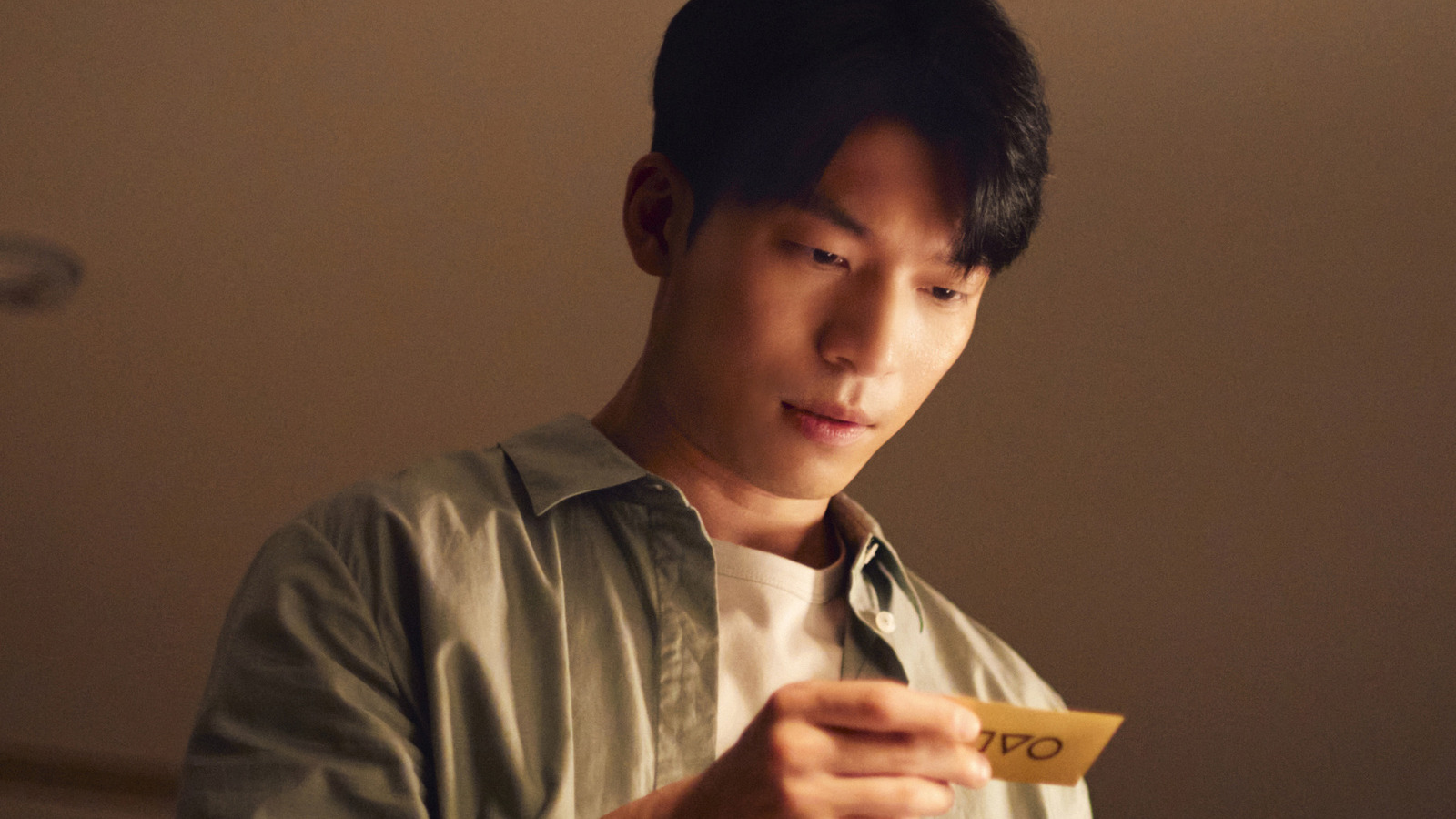
At long last, season 3 of “Squid Game” has arrived, and it’s an exhilarating rollercoaster ride! Ever since Season 2 ended with a foiled uprising, fans have been biting their nails in anticipation. In this new installment, the players are split into two factions: one determined to halt the games forever, and another eager for them to continue. Guessing that the pink troops will intervene should one side attack the other, Seong Gi-hun (Lee Jung-jae) cleverly employs this knowledge to set an ambush for the soldiers. Joining forces with his fellow anti-games crusaders, they launch a daring assault towards the control room.
The strategy might have been successful if not for Gi-hun’s team running out of ammunition and Hwang In-ho, disguised as Oh Young-il, betraying them. As the second season concludes, Park Jung-bae is brutally executed in front of Gi-hun, causing shock among both the character and viewers. This sets up the final episodes of “Squid Game” Season 3, which doesn’t fail to impress and offers more depth than initially apparent — here are some subtle aspects in the show’s closing season that you might have missed.
Player 149’s hairpin blade represents life and death

In “Squid Game” Season 2, we meet the elderly mother-son pair, Jang Geum-ja (played by Kang Ae-shim) and Park Yong-sik (Yang Dong-geun). Despite her age, Geum-ja possesses a hidden advantage – a concealed blade within her hairpin. It might seem surprising that the guards would overlook any personal items on her and let her carry a weapon into the game. However, it likely adds to the thrill for the guards and the VIPs.
In Season 3, we witness Geum-ja utilizing her knife on two occasions in rapid succession. During a game of hide and seek, Geum-ja remains with Kim Jun-hee (Jo Yu-ri) as she gives birth. Upon the baby’s delivery, Geum-ja employs the knife to sever the umbilical cord. Shortly thereafter, they attempt to flee when confronted by Yong-sik, who has thus far failed to kill anyone and is in danger of being eliminated himself. In a desperate move, Yong-sik brandishes his knife towards Jun-hee and the baby, but it’s Geum-ja who stabs her own son fatally in the back. Tragically, Geum-ja meets her demise soon after, which was foreshadowed by Kang as her character wouldn’t survive beyond “Squid Game” Season 3 even before its release.
The knife holds a dual function — utility and conflict. It’s instrumental in bringing new life into existence and, conversely, in concluding it. This tool symbolizes the contrasting aspects inherent in the game, reflecting both mankind’s darkest impulses and the potential for redemption that can emerge from such strife.
The jump rope song has sinister undertones
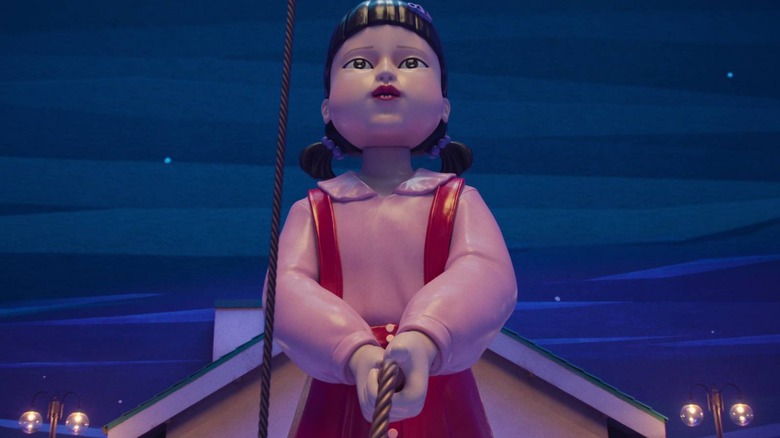
The series ‘Squid Game’ skillfully combines chilling scenes with seemingly harmless visuals. This is fitting since the participants play childish games for survival and wealth, but the darker meanings might not be obvious to everyone.
While I was hopping along during our jump rope game, a tune played as the rope arced gracefully over the bridge. Though I didn’t understand the words, it seemed to predict the grim events that were about to unfold. One line from the song was, “Dear companion, dear companion, take a look behind.” As Player 096 (Lee Suk) nudged us towards our fates, preventing us from fully reaching the other side, Player 349 (Kim Geum-sun) discerned that continuing forward was futile. Instead, she decided to turn back, hoping at least to halt her jumping. Unfortunately for her, things didn’t end well…
The song in question includes phrases such as “Touch the ground” and “Now you depart,” which hold a clear dual meaning. If a character is struck by the beam, they would fall multiple stories down, symbolically following the instruction to “go away.” Additionally, “Touch your toe” might imply that if someone fails to jump, the beam will hit their feet (specifically toes), leading to their demise. Numerous films and series have employed eerie children’s songs in the past, but this one sets a new standard for unsettling melodies.
Superhero references galore

According to various opinions, Thanos (Choi Seung-hyun) could be the most disliked character in “Squid Game” Season 2. His electrifying performance in the games and his Marvel-inspired Infinity Stone-themed nail polish provided entertaining Easter eggs for fans. However, it seems that the series wasn’t ready to part ways with comic book references even after Thanos’s demise at the end of Season 2. In the premiere of Season 3, Episode 1 titled “Keys and Knives,” Nam-gyu (Roh Jae-won) discusses Se-mi’s (Won Ji-an) death with Min-su (Lee David), referring to her as if she thought she was Wonder Woman. This casual comment might not seem significant on its own, but the character of Wonder Woman is mentioned again in Episode 3, “It’s Not Your Fault.”
In a conversation among the influential individuals, it was suggested that Jun-hee might experience an extraordinary surge of power due to her determination to safeguard her newborn baby. One person speculated she could become something like a Marvel superhero. Another then questioned if she’d be more like Wonder Woman. However, he was swiftly corrected as Wonder Woman is actually a DC Comics character. This exchange highlights the global influence of American comic books. It’s intriguing to observe that the less affluent group can accurately identify these characters, while the VIP seems unaware that Wonder Woman isn’t from Marvel. It appears that superhero films serve as an escape for these young people, whereas the wealthy elite seem disconnected from current trends. It seems they are too engrossed in witnessing violent deaths to appreciate comic books.
Squid Game Season 3 loves the trolley problem
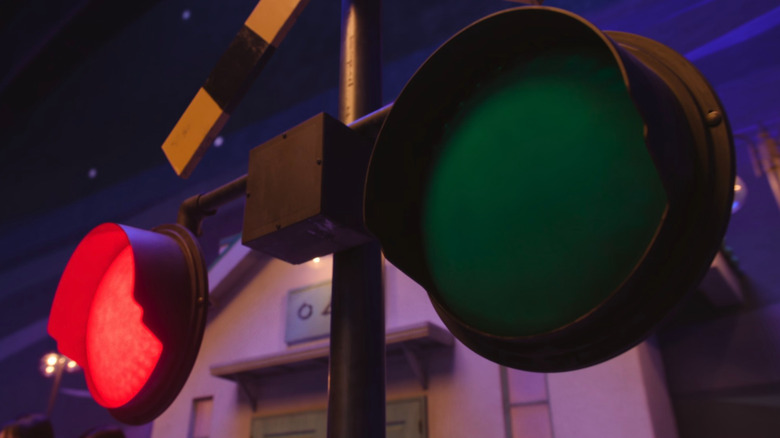
One compelling theory about “Squid Game” Season 3, before it was released on Netflix, was that the ethical dilemma known as the trolley problem would significantly influence the storyline. The trolley problem is a hypothetical scenario where an individual must decide whether to let a runaway train kill a group of strangers or divert its course and save their loved one at the cost of innocent lives. This ethical quandary undeniably plays a crucial role in “Squid Game” Season 3’s plot development.
When the contestants walk into the room to start jump rope, it’s set up like a railroad crossing area. There’s a sign similar to those at railroad crossings that lights up green once the timer starts. The area they need to leap across is marked like a railway track. But by the end of Episode 4, “222,” Seong Gi-hun (Lee Jung-jae) faces a unique dilemma reminiscent of a trolley problem.
In this scenario, Lee Byung-hun’s character presents Gi-hun with a difficult decision: Either eliminate the remaining contestants to ensure his own life and that of the baby, or let them attack, potentially resulting in the death of all involved, including Min-su. This is akin to the well-known trolley problem, where Gi-hun chooses not to harm the other men at present.
Player 044 had one prediction come true

As a dedicated admirer, I’d rephrase it like this: In Squid Game, I, as a spectator, have come to know Seon-nyeo (played by Chae Kook-hee) – a woman who claims to be a shaman. She offers Gi-hun ominous predictions that sometimes seem cryptic, yet as the series progresses, it’s evident she’s more of a charlatan than a genuine spiritual guide. Her supposed powers are nonexistent, and this becomes strikingly clear in Season 3 during the game of hide and seek. In this maze, Seon-nyeo gathers followers who blindly follow her commands. Tragically, she leads them to their doom, narrowly escaping death herself.
As a devoted admirer, I find myself recounting an instance where Song Young-chang, alias Jeong-dae, cruelly betrays me at the exit by snatching a vital key, thereby trapping me within this intricate labyrinth. Enraged, I unleash a torrent of anger, crying out, “May the celestial powers shatter your skull, snap your spine, and reduce you to dust!” Ironically, my words prove prophetic as Min-su ends my life shortly thereafter.
In the final round of Sky Squid Game, Jeong-dae found himself among the last competitors. However, during a heated altercation, he tumbled from an enormous structure and landed harshly on the ground below. It’s likely that his head was fractured, his back broken, and his internal organs were severely damaged in the fall. Seon-nyeo may not have had any supernatural abilities, but she managed to achieve a certain kind of justice in this instance.
The keys and knives resemble magical girl wands
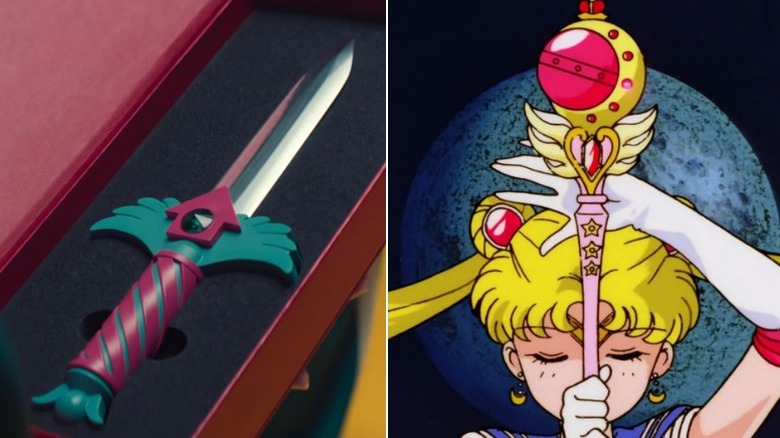
In a game similar to hide and seek, some players are tasked with finding exits using keys that have wings and jewels on them, while others are given knives with the same decorations to eliminate those trying to escape. The contrasting pink and teal colors of these items, along with their design, is reminiscent of the “Squid Game” theme where ordinary objects become dangerous. To someone unfamiliar with anime or manga, these might look like magical girl wands.
In popular magical girl shows such as “Sailor Moon,” “Cardcaptor Sakura,” and “Pretty Cure,” the leading ladies often employ wands, rods, or staffs, which serve both as tools and weapons. These enchanted objects are not only powerful but also stylish, reflecting the idea that fighting evil while maintaining adorable appearances is a must when saving the world! Design elements like feathered and gem-encrusted patterns can be traced back to the keys and knives from “Squid Game” Season 3. If you’ve finished watching “Squid Game” and are searching for something lighter, I recommend checking out the magical girl anime movie currently trending on Netflix.
The final dinner’s setup is symbolic
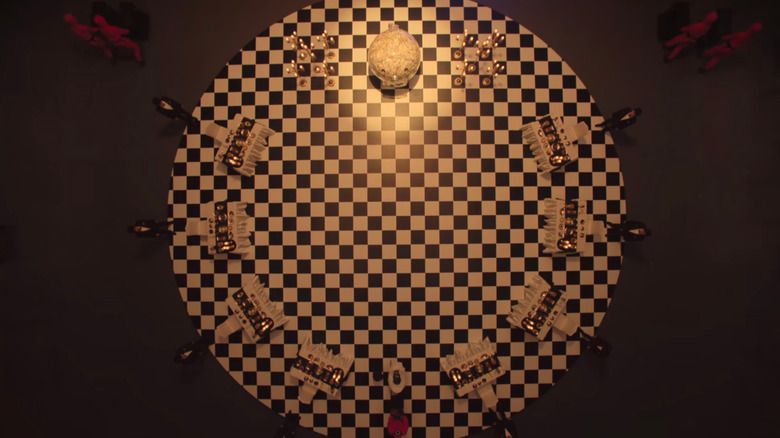
In Episode 4, the dinner scene is filled with tension and hidden messages for keen-eyed viewers. Interestingly, the table forms a circle, mirroring the significance of spheres in the final game. To initiate the game, one must push a sphere embedded in the ground, while the final tower resembles a circle too, making this a recurring motif across Season 3.
It’s noteworthy that during Season 1, the table for the finalists was triangular in shape. This triangle is frequently used in promotional materials and logos for “Squid Game,” along with a square, which are also significant shapes seen together in the show’s opening credits. These shapes have been recurring elements across various games throughout the series’ three seasons.
A peek into the Front Man and Captain Park’s past

In just a fleeting instant, you might miss it, but if you carefully observe the scene when Hwang Jun-ho (Wi Ha-joon) steps into Captain Park’s (Oh Dal-su) ship cabin, you’ll spot a photo of the captain beaming with others. One of these people, the one flashing a big fish and a broad smile, seems to be The Front Man, hinting at their past association. Although we don’t learn exactly how they met (maybe they were teammates prior to Captain Park getting another chance on the ocean), what is clear is that in Episode 4, Park’s rule of deceit and oppression comes to an end.
It wasn’t until Season 3 that viewers and the police fully understood Choi Woo-seok’s (Jeon Seok-ho) role in the game following his actions against a drone pilot in Season 2. In this season, he unravels the mystery surrounding Park. During his search of Park’s home, he discovers a mask and costume connecting him to the games, and his dog is killed after it bites him. The police temporarily impede Choi from revealing the truth to Jun-ho, but he manages to communicate it in time. The Captain then causes chaos among his crew before being eliminated by Jun-ho using a spear fishing gun. Meanwhile, Park intentionally leads Jun-ho’s agents away from the island location, a deception that Jun-ho eventually uncovers, allowing them to approach the Island more closely than ever by Episode 5.
The handprints on the wall during the hide and seek game mean more than you think
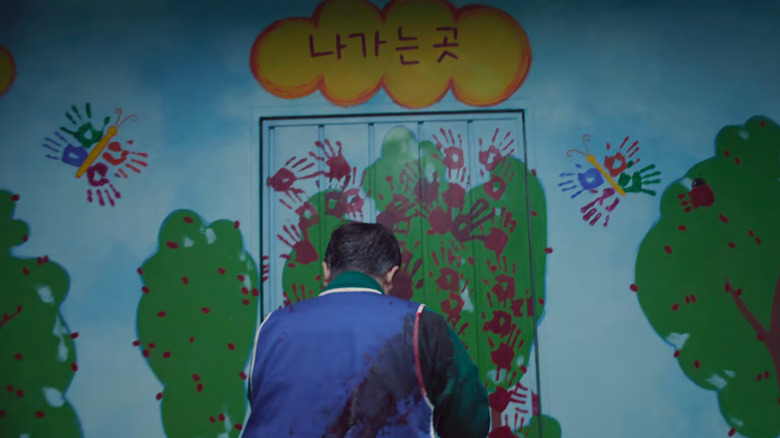
In every Squid Game room designed for deadly play, the setting for the hide and seek game involving blades and keys is reminiscent of a children’s playroom, adorned with colorful walls that bear handprints in vibrant neon paint – a common decorative element found in places frequented by kids, such as schools or recreational centers. These handprints are usually used to track a child’s growth or can be transformed into various animals with some creativity. However, these seemingly innocent handprints seem to hold a hidden message of sorts.
In the last room where victorious contestants insert keys they’ve obtained through each other’s deaths into the final door’s lock for an illusion of liberty, the palm prints turn into a frenzied symphony of blood-red smears, resembling those left by people in a stampede. Given the gruesome events that occur within this room, it wouldn’t be surprising if this was the intended impact. The show’s ability to blend innocence with terror is unparalleled, and this is just one more subtle aspect that encapsulates the essence of “Squid Game” as a whole.
The prize money delivery is darker than you might realize

From Season 1 of “Squid Game,” players received their earnings in an envelope adorned with a black background and a pink ribbon. This ritual was depicted not just once but twice – first during Season 1 and later when Jun-ho received Kim Jun-hee’s baby. Initially, it might have appeared as a thematic decision considering the preference for pink and black by the Pink Guards. However, in Season 3, we learn that this symbolism is far more chilling than initially perceived. As each deceased player from the games is placed in a black coffin, they are bound with a pink ribbon. It’s later revealed that these bodies are harvested for their organs, which are sold on the illegal black market. Unsurprisingly, it’s discovered that this gruesome practice is intertwined with the dark underbelly of the games themselves.
It’s intriguing how death and prosperity are contrasted, clearly reinforcing the series’ main ideas – the wealthy grow more affluent while the less fortunate become poorer. Achieving wealth like those in power requires giving up everything, including your life, body, and soul, to an empty abyss.
The lottery ticket in the final shot is more than set decoration
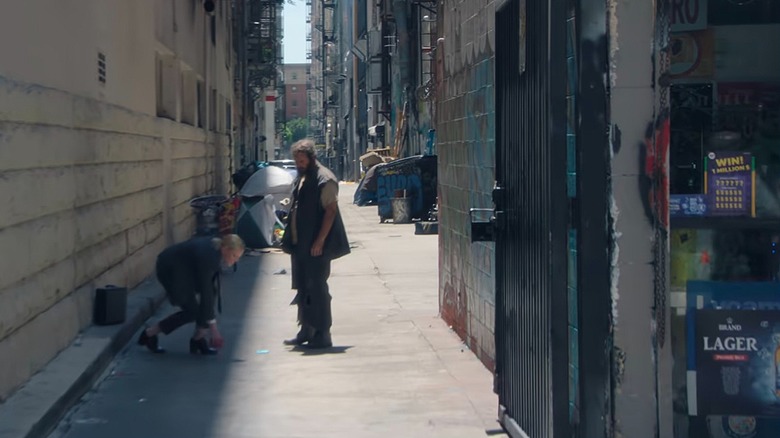
The closing scene of “Squid Game” may prompt viewers to ponder significant queries, like “Why is Cate Blanchett present here?” and “How could a random American know how to play ddakji when it’s unlikely that ‘Squid Game’ would have enlightened Americans about this game?” Upon questioning these points, you might also observe intriguing cinematic elements in the final frame.
In the scene where Blanchett’s character engages in ddakji with a potential Squid Game contestant in a narrow lane, a lottery ticket is noticeably displayed in a shop window nearby. This references the destitute individuals forced to pick between bread and lottery tickets at the start of Season 2. It also aligns with the overarching motif of “Squid Game,” which delves into how people pushed to the brink will take extreme risks for a shot at substantial winnings, despite the minuscule chances of success.
Who is the new recruiter targeting in the closing scene?

In a surprising twist, the conclusion of “Squid Game” Season 3 turns out to be even more dismal than initially perceived. Following Hwang In-ho handing over Gi-hun’s earnings to his daughter, he’s seen in the backseat of a vehicle navigating Downtown Los Angeles. Notably, the car passes by Spring Street, part of Gallery Row. This district, while undergoing gentrification, remains adjacent to Skid Row, a densely populated area housing thousands of homeless individuals.
Later on, In-ho observes Cate Blanchett engaging in a game called ddakji with a disheveled man. This scene strongly implies that an American adaptation of Squid Game is underway, and Blanchett’s character serves as the recruiter for this deadly competition. The ominous backdrop of Skid Row intensifies the series finale, suggesting that the American salesman deliberately targets homeless individuals, offering them a chance to escape poverty, but ultimately leading them towards their demise in the process.
As a devoted fan, I’m thrilled about the upcoming American adaptation of “Squid Game” by Netflix. The intriguing teaser hints that this spinoff will preserve the haunting undertones of the original series. It seems that numerous contestants in this version could be struggling individuals with unstable housing or burdened by crippling debt, leaving them feeling like they’re perpetually locked out of the American dream.
Read More
- Silver Rate Forecast
- Gold Rate Forecast
- Gods & Demons codes (January 2025)
- Mech Vs Aliens codes – Currently active promos (June 2025)
- Honor of Kings returns for the 2025 Esports World Cup with a whopping $3 million prize pool
- Grimguard Tactics tier list – Ranking the main classes
- Superman: DCU Movie Has Already Broken 3 Box Office Records
- Former SNL Star Reveals Surprising Comeback After 24 Years
- USD CNY PREDICTION
- Kanye “Ye” West Struggles Through Chaotic, Rain-Soaked Shanghai Concert
2025-06-27 23:32